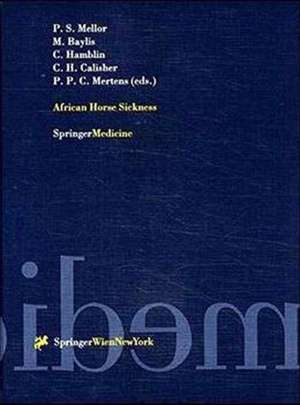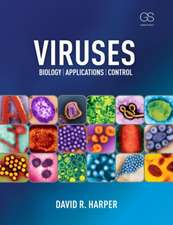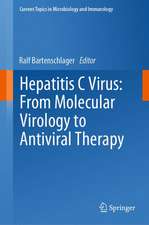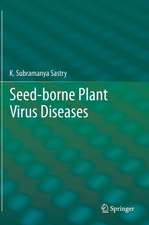African Horse Sickness: Archives of Virology. Supplementa, cartea 14
Editat de Philip S. Mellor, Matthew Baylis, Christopher Hamblin, Charles H. Calisher, Peter P.C. Mertensen Limba Engleză Hardback – 14 sep 1998
| Toate formatele și edițiile | Preț | Express |
|---|---|---|
| Paperback (1) | 1425.04 lei 6-8 săpt. | |
| SPRINGER VIENNA – 16 sep 1998 | 1425.04 lei 6-8 săpt. | |
| Hardback (1) | 1313.93 lei 38-45 zile | |
| SPRINGER VIENNA – 14 sep 1998 | 1313.93 lei 38-45 zile |
Din seria Archives of Virology. Supplementa
-
 Preț: 404.29 lei
Preț: 404.29 lei -
 Preț: 428.56 lei
Preț: 428.56 lei -
 Preț: 391.40 lei
Preț: 391.40 lei - 5%
 Preț: 381.54 lei
Preț: 381.54 lei - 5%
 Preț: 1102.31 lei
Preț: 1102.31 lei - 18%
 Preț: 961.55 lei
Preț: 961.55 lei - 24%
 Preț: 820.00 lei
Preț: 820.00 lei -
 Preț: 393.52 lei
Preț: 393.52 lei - 5%
 Preț: 1014.10 lei
Preț: 1014.10 lei - 15%
 Preț: 600.26 lei
Preț: 600.26 lei - 18%
 Preț: 1234.94 lei
Preț: 1234.94 lei -
 Preț: 397.76 lei
Preț: 397.76 lei - 5%
 Preț: 384.80 lei
Preț: 384.80 lei -
 Preț: 414.30 lei
Preț: 414.30 lei -
 Preț: 399.29 lei
Preț: 399.29 lei -
 Preț: 401.24 lei
Preț: 401.24 lei -
 Preț: 401.03 lei
Preț: 401.03 lei -
 Preț: 424.33 lei
Preț: 424.33 lei
Preț: 1313.93 lei
Preț vechi: 1383.08 lei
-5% Nou
Puncte Express: 1971
Preț estimativ în valută:
251.41€ • 262.50$ • 208.08£
251.41€ • 262.50$ • 208.08£
Carte tipărită la comandă
Livrare economică 31 martie-07 aprilie
Preluare comenzi: 021 569.72.76
Specificații
ISBN-13: 9783211831335
ISBN-10: 3211831339
Pagini: 344
Ilustrații: VIII, 344 p. 105 illus., 9 illus. in color.
Ediția:1998
Editura: SPRINGER VIENNA
Colecția Springer
Seria Archives of Virology. Supplementa
Locul publicării:Vienna, Austria
ISBN-10: 3211831339
Pagini: 344
Ilustrații: VIII, 344 p. 105 illus., 9 illus. in color.
Ediția:1998
Editura: SPRINGER VIENNA
Colecția Springer
Seria Archives of Virology. Supplementa
Locul publicării:Vienna, Austria
Public țintă
ResearchCuprins
Epidemiology.- Taxonomy of African horse sickness viruses.- Epidemiology of African horse sickness and the role of the zebra in South Africa.- Transmission and distribution of African horse sickness virus serotypes in South African zebra.- Serological and virological responses in mules and donkeys following inoculation with African horse sickness virus serotype 4.- Donkeys as reservoirs of African horse sickness virus.- Clinical, virological and immune responses of normal and immunosuppressed donkeys (Equus asinus africanus) after inoculation with African horse sickness virus.- Immunohistochemical demonstration of African horse sickness viral antigen in tissues of experimentally infected equines.- Entomology.- The 1996 outbreak of African horse sickness in South Africa — the entomological perspective.- The seasonal and geographical distribution of Culicoides imicola, C. pulicaris group and C. obsoletus group biting midges in central and southern Spain.- The relationship between climate and the distribution of Culicoides imicola in Iberia.- Simulation studies of African horse sickness in Spain.- The Culicoides vectors of African horse sickness virus in Morocco: distribution and epidemiological implications.- Studies of the mortality rate of Culicoides imicola in Morocco.- Modelling the distribution and abundance of Culicoides imicola in Morocco and Iberia using climatic data and satellite imagery.- Effect of temperature on African horse sickness virus infection in Culicoides.- Duration of repellency of various synthetic and plant-derived preparations for Culicoides imicola, the vector of African horse sickness virus.- Molecular biology.- New generation of African horse sickness virus vaccines based on structural and molecular studies of the virus particles.- Expressionof the major core structural proteins VP3 and VP7 of African horse sickness virus, and production of core-like particles.- VP7 from African horse sickness virus serotype 9 protects mice against a lethal, heterologous serotype challenge.- Molecular epidemiology of African horse sickness virus based on analyses and comparisons of genome segments 7 and 10.- Structural studies of orbivirus particles.- Characterization of two African horse sickness virus nonstructural proteins, NS1 and NS3.- Development of a mouse model system, coding assignments and identification of the genome segments controlling virulence of African horse sickness virus serotypes 3 and 8.- Phylogenetic analysis of African horse sickness virus segment 10: sequence variation, virulence characteristics and cell exit.- Vaccines and diagnosis.- Future international management of African horse sickness vaccines.- Application of an indirect fluorescent antibody assay for the detection of African horse sickness virus antibodies.- Validation of ELISA for the detection of African horse sickness virus antigens and antibodies.- Use of reverse transcriptase-polymerase chain reaction (RT-PCR) and dot-blot hybridisation for the detection and identification of African horse sickness virus nucleic acids.- Western immunoblotting as a method for the detection of African horse sickness virus protein-specific antibodies: Differentiation between infected and vaccinated horses.- Conclusions and recommendations of the meeting.




